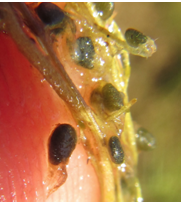ICSE 6 Biology
The Leaf


Question 1:
Which part is said to be the reproductive organ of the plant?[Level: Easy]
Question 2:
Read the following statements and answer the following questions.
(a) I am plant part which absorbs energy from Sun.
(b) I am called as food factory.
(c) I do not grow continuously.
Who am I? [Level: Moderate]
Question 3:
Thin thread like structures present in the roots which allows absorption of water and minerals are __________. [Level: Easy]
Question 4:
Fibrous roots are found in
(a) gram
(b) pea
(c) grass
(d) pine [Level: Easy]
Question 5:
Write the functions of the stem. [Level: Moderate]
Question 6:
Leaf is said to the plant food factories. Which structure on the leaf help in intake of gas for food preparation? What are cells surrounding these structures? [Level: Difficult]
Question 7:
What is phyllotaxy? Draw alternate phyllotaxy and give one example. [Level: Moderate]
Question 8.
What type of phyllotaxy is shown in the given picture? Identify the plant. [Level: Difficult]
Question 9:
Give one example of each.
(a) Compound leaf
(b) Needle shaped leaf
(c) Leaf with wavy margins
(d) Whorled phyllotaxy
(e) Parallel venation [Level: Moderate]
Question 10:
How transpiration helps in cooling the plant? [Level: Difficult]
Question 11:
How transpirational pull helps in absorption of water and minerals by the roots? [Level: Difficult]
Question 12:
What are leaf tendrils? How they provide support to the plant? [Level: Difficult]
Question 13:
How spines reduce the water loss in certain plants? [Level: Moderate]
Question 14:
What is the function of scale leaves? [Level: Moderate]
Question 15:
What is vegetative propagation? Name two plants where leaves produce buds for vegetative propagation. [Level: Moderate]
Question 16:
Name the buds produced by Bryophyllum which help in vegetative propagation. [Level: Easy]
Question 17:
Which process is shown in the picture below?
Write a reaction to represent the process? [Level: Moderate]
Question 18:
Why Venus flytrap is an insectivorous plant? [Level: Difficult]
Question 19:
Where do we find pitcher plant in India? [Level: Easy]
Question 20:
Name the plant is shown in the picture below.

What type of plant is this? [Level: Moderate]
**********
In summary, problem-solving after learning a theoretical concept on CBSE The Leaf ICSE 6 Biology is an essential part of the learning process. It enhances your understanding, critical thinking abilities, and retention of knowledge. Moreover, it equips you with valuable skills that are applicable in academic, personal, and professional contexts.
You must have heard of the phrase “Practice makes a man perfect”. Well, not just a man, practice indeed enhances perfection of every individual.
Practicing questions plays a pivotal role in achieving excellence in exams. Just as the adage goes, "Practice makes perfect," dedicating time to solve a diverse range of exam-related questions yields manifold benefits. Firstly, practicing questions allows students to familiarize themselves with the exam format and types of problems they might encounter. This familiarity instills confidence, reducing anxiety and improving performance on the actual exam day. Secondly, continuous practice sharpens problem-solving skills and enhances critical thinking, enabling students to approach complex problems with clarity and efficiency. Thirdly, it aids in identifying weak areas, allowing students to focus their efforts on improving specific topics. Moreover, practice aids in memory retention, as active engagement with the material reinforces learning. Regular practice also hones time management skills, ensuring that students can allocate appropriate time to each question during the exam. Overall, practicing questions not only boosts exam performance but also instills a deeper understanding of the subject matter, fostering a holistic and effective learning experience.
All About Daily Practice Problems on ICSE 6 Biology The Leaf NCERT Chapter 1
Our Daily Practice Problems (DPPs) offer a diverse range of question types, including Multiple Choice Questions (MCQs) as well as short and long answer types. These questions are categorized into Easy, Moderate, and Difficult levels, allowing students to gradually progress and challenge themselves accordingly. Additionally, comprehensive solutions are provided for each question, available for download in PDF format - Download pdf solutions as well as Download pdf Questions. This approach fosters a holistic learning experience, catering to different learning styles, promoting self-assessment, and improving problem-solving skills. With our well-structured DPPs, students can excel in exams while gaining a deeper understanding of the subject matter. Hope you found the content on ICSE 6 Biology The Leaf NCERT Chapter 1 useful.
Last but not least, to get the best hold on ICSE 6 Biology The Leaf NCERT Chapter 1, do not forget to check out: